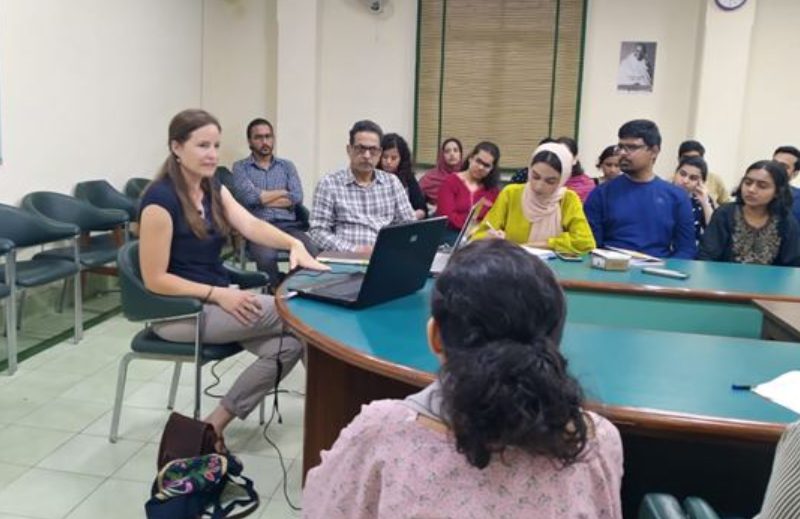
As part of an international academic collaboration with University of Applied Sciences, Erfurt, Germany, the Department of Social Work, Jamia Millia Islamia organised an interactive session of the students and faculty with Prof. Christine Rehklau on the theme, “War in Ukraine: Challenges for social workers from an anti racist perspective”. The session which lasted for more than two hours was organized on September 23, 2022.
Prof.Christine Rehklau, to lay down the context, began by sharing that among the applications for asylum received by refugees of different nationalities between January to June 2022, those from Syria topped the list followed by Afghanistan. The influx of refugees from Ukraine also kept on increasing from March to August 2022. She informed the audience that the responsiveness of the political regime and the civil society to this refugee influx, has been unprecedented. Temporary protection was offered, which is an emergency mechanism that can be applied in case of mass influx of persons with an aim to provide an immediate and collective protection, to the displaced persons who are not in a position to return to their country of origin. This meant that the individual applications need not be examined to be accepted as a refugee. A total of 29000 Ukranian refugees had come to Germany as of 23rd August 2022. Ironically, even amongst those seeking refuge, there is a distinction, with the Roma people being the most vulnerable group, who do not have identity documents. They have been in a difficult situation in their country of origin and stand the chance of being discriminated against in the receiving country. That raises a word of caution for social workers who are responding to the refugees from Ukraine, so as to continue functioning in a non-prejudicial manner.
The speaker apprised the audience of the various measures taken by the State as part of the humanitarian response to the Ukranian refugees. Free public transport, trains to the first destination in Germany being free, being allowed to stay with relatives and friends, higher social security benefits, access to German language courses and labour market programs, better health benefits were enlisted as some of the steps. In addition, the house was informed that the refugees from Afghanistan and Syria were asked to shift to other community buildings to make space for the Ukranian refugees. This was a matter of concern.
The social workers have had a significant role to play in the refugee crisis. The challenges to operate from an anti-racist perspective were discussed extensively. Continuous self-reflection is required to prevent oneself from falling into the trap, consciously or unconsciously. She cautioned social workers from holding any tacit belief that supporting some could be more beneficial as the others may have a lesser chance of success in society. The session focused on the need for social workers to engage in an active process of identifying and eliminating racism by changing systems, organizational structures, policy practices and attitudes. The speaker also responded to queries of students regarding the German response to refugees in general. The speaker emphasized that Social Work as a profession has to continue to evolve in response to the emerging situations.
Given the contemporariness of the issue, the session evoked a volley of questions from the participants, which made it extremely engaging. The lecture marked the end of a week-long engagement of with the German delegates. The collaboration with the University of Applied Sciences, Erfurt has been two decades long and the students along with faculty from Jamia Millia Islamia and University of Applied Sciences, Erfurt have been participating in student exchange programs along with other initatives. To honour the two decades of collaboration, the two delegates from the Department of Social Work, University of Applied Sciences, Erfurt were honoured with an ethnic shawl and a souvenir mug. Prof. Ashvini Kumar Singh and Dr. Lalhmingmawii Gangte had coordinated the weeklong programme along with the head of the department, Prof. Neelam Sukhramani.


